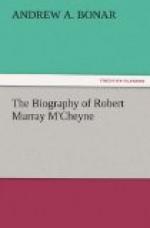On Sabbath the 12th, he preached upon Heb. 9:15 in the forenoon, and Rom. 9:22, 23, in the afternoon, with uncommon solemnity; and it was observed, both then and on other late occasions, he spoke with peculiar strength upon the sovereignty of God. These were his last discourses to his people in St. Peter’s. That same evening he went down to Broughty Ferry, and preached upon Isaiah 60:1, “Arise, shine.” etc. It was the last time he was to be engaged directly in proclaiming Christ to sinners; and as he began his ministry with souls for his hire, so it appears that his last discourse had in it saving power to some, and that rather from the holiness it breathed than from the wisdom of its words. After his death, a note was found unopened, which had been sent to him in the course of the following week, when he lay in the fever. It ran thus: “I hope you will pardon a stranger for addressing to you a few lines. I heard you preach last Sabbath evening, and it pleased God to bless that sermon to my soul. It was not so much what you said, as your manner of speaking that struck me. I saw in you a beauty in holiness that I never saw before. You also said something in your prayer that struck me very much. It was, ’Thou knowest that we love Thee.’ Oh, sir, what would I give that I could say to my blessed Saviour, ‘Thou knowest that I love Thee!’”
Next evening he held a meeting in St. Peter’s, with the view of organizing his people for collecting in behalf of the Free Protesting Church,—the disruption of the Establishment being now inevitable. He spoke very fervently; and after the meeting felt chilled and unwell. Next morning he felt that he was ill; but went out in the afternoon to the marriage of two of his flock. He seemed, however, to anticipate a serious attack, for, on his way home, he made some arrangements connected with his ministerial work, and left a message at Dr. Gibson’s house, asking him to come and see him. He believed that he had taken the fever, and it was so. That night he lay down upon the bed from which he was never to rise. He spoke little, but intimated that he apprehended danger.
On Wednesday, he said he thought that he would never have seen the morning, he felt so sore broken, and had got no sleep; but afterwards added, “Shall we receive good at the hand of the Lord, and shall we not receive evil also?” He seemed clouded in spirit, often repeating such passages as—“My moisture is turned into the drought of summer;”—“My bones wax old, through my roaring all day long.” It was with difficulty that he was able to speak a few words with his assistant, Mr. Gatherer. In the forenoon, Mr. Miller of Wallacetown found him oppressed with extreme pain in his head. Amongst other things they conversed upon Ps. 126. On coming to the 6th verse, Mr. M’Cheyne said he would give him a division of it. 1. What is sowed—“Precious seed.” 2. The manner of sowing it—“Goeth forth and weepeth.” He dwelt upon “weepeth”




